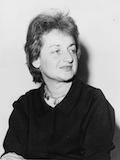As a freshman at Smith College in 1938, Betty Friedan (1921-2006), a future leader of American feminism, unexpectedly found herself embroiled in the debate over the plight of Germany’s Jews.
In the wake of the Kristallnacht pogrom, college president William Allen Neilson urged the students to sign a petition asking President Franklin Roosevelt to let German Jewish girls enter the U.S. outside the immigration quotas, in order to enroll at Smith. Each student house held its own discussion on whether to sign. “A number of girls spoke against it, about not wanting any more Jews at Smith,” Friedan later recalled.
There were four older, well-to-do Jewish girls in her house– “the type that spoke in whispery voices and became utterly anemic because they did not want to be known as Jews,” as she put it. “I expected them to speak up [in favor of the petition], but they didn’t. Finally, despite being only a freshman from Peoria, I spoke, urging that we open our doors to those girls fleeing persecution.” Despite her plea, the petition was rejected by a large margin.
Friedan later stirred controversy by asserting, in her bestselling book The Feminist Mystique, that suburban homes were “comfortable concentration camps.” Friedan subsequently retracted that phrase, writing in her autobiography that “I got carried away….The American suburb was no concentration camp.”
Sources: Hennessee, Betty Friedan, 21-22;
Friedan, Life So Far, 36.











